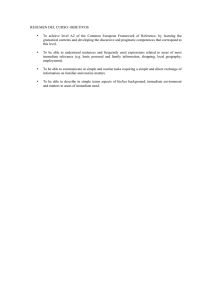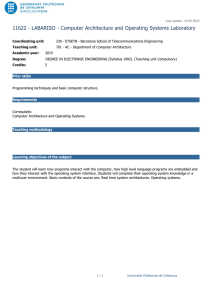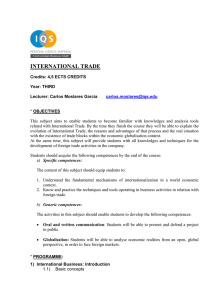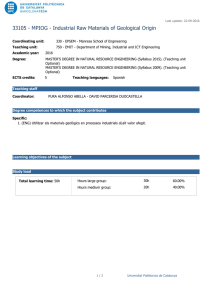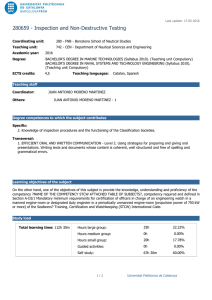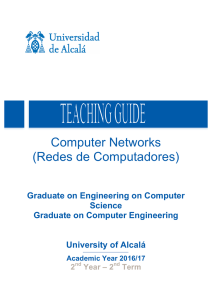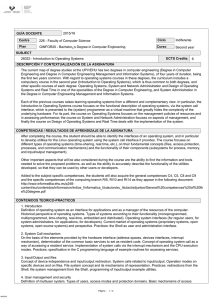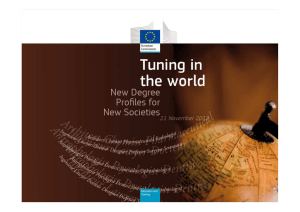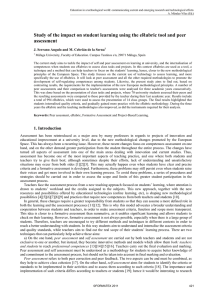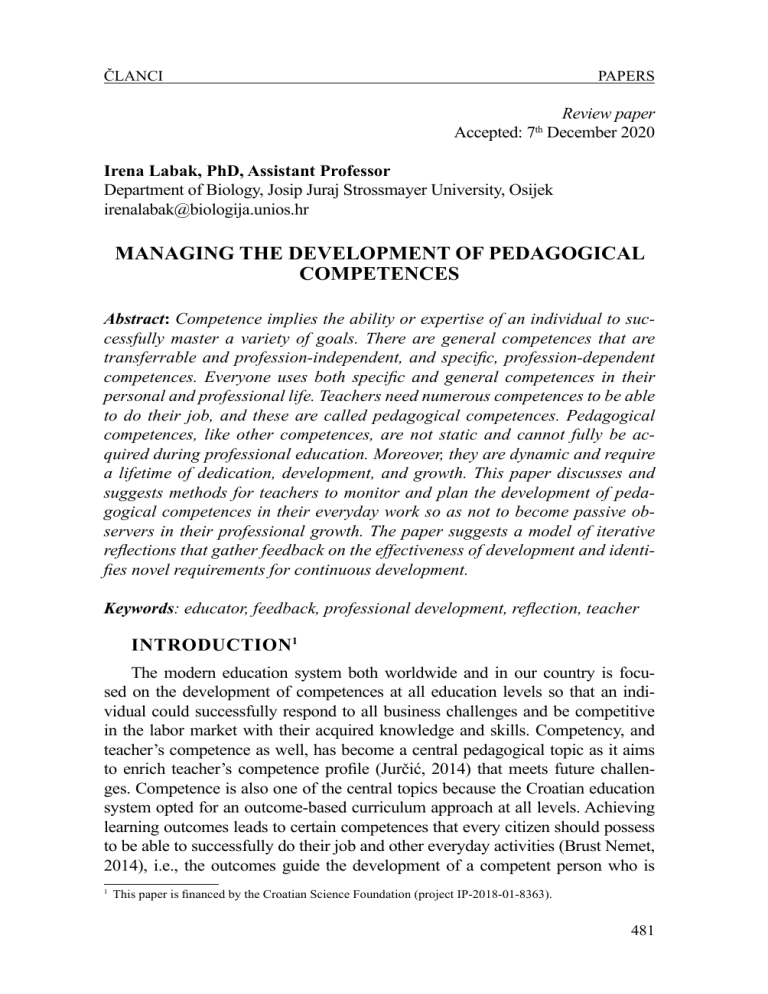
ČLANCI PAPERS Review paper Accepted: 7th December 2020 Irena Labak, PhD, Assistant Professor Department of Biology, Josip Juraj Strossmayer University, Osijek [email protected] MANAGING THE DEVELOPMENT OF PEDAGOGICAL COMPETENCES Abstract: Competence implies the ability or expertise of an individual to successfully master a variety of goals. There are general competences that are transferrable and profession-independent, and specific, profession-dependent competences. Everyone uses both specific and general competences in their personal and professional life. Teachers need numerous competences to be able to do their job, and these are called pedagogical competences. Pedagogical competences, like other competences, are not static and cannot fully be acquired during professional education. Moreover, they are dynamic and require a lifetime of dedication, development, and growth. This paper discusses and suggests methods for teachers to monitor and plan the development of pedagogical competences in their everyday work so as not to become passive observers in their professional growth. The paper suggests a model of iterative reflections that gather feedback on the effectiveness of development and identifies novel requirements for continuous development. Keywords: educator, feedback, professional development, reflection, teacher INTRODUCTION1 The modern education system both worldwide and in our country is focused on the development of competences at all education levels so that an individual could successfully respond to all business challenges and be competitive in the labor market with their acquired knowledge and skills. Competency, and teacher’s competence as well, has become a central pedagogical topic as it aims to enrich teacher’s competence profile (Jurčić, 2014) that meets future challenges. Competence is also one of the central topics because the Croatian education system opted for an outcome-based curriculum approach at all levels. Achieving learning outcomes leads to certain competences that every citizen should possess to be able to successfully do their job and other everyday activities (Brust Nemet, 2014), i.e., the outcomes guide the development of a competent person who is 1 This paper is financed by the Croatian Science Foundation (project IP-2018-01-8363). 481 I. Labak, Managing the development of pedagogical competences qualified to perform a particular job (Đuranović et al., 2013). Kurtz and Bartram (2002) distinguish competence from competency. According to them, competence reflects one’s ability to use competencies (knowledge and skills) in completing work activities, while competency is a much broader concept enabling an individual to act competently. Competence is defined differently by different authors, but there are numerous common characteristics given in all the definitions (Jurčić, 2014). According to the English-Croatian dictionary, the word competentia, which is of Latin origin, is translated as competency, ability, or expertise (Bujas, 2001). Weinert (2001) interprets competence as a combination of cognitive, motivational, moral, and social skills that are available to an individual and necessary for them to successfully master various requirements, tasks, problems, and goals. In addition to demonstrating standardized forms of knowledge and skills, competences also include the level of understanding, responsibility and ethical values (Račić, 2013). Competence is a personal ability to act, perform, manage, or act at the level of certain knowledge, skills, and abilities (Mijatović, 2000). The European Commission (EC) has identified eight key competences for lifelong learning, i.e., communication competence, mathematical competence and basic competences in science and technology, digital competence, learning to learn, social and civic competence, sense of initiative and entrepreneurship, and cultural awareness and expression. These competences represent the general knowledge and skills necessary for the personal and professional development of individual and are understood as a prerequisite for lifelong learning. They need to be acquired during school education, and updated and improved throughout life (EC Recommendation, 2006). Competences complement each other, and different knowledge and skills apply to various competences (Roe, 2002) that enable a successful response to numerous challenges and coping in specific situations (Kunter et al., 2013). Depending on the environment and the situation, an individual uses a certain competence or one of its components to successfully perform the task (Huić et al., 2010). This leads to the notion of competence as a multidimensional construct that connects knowledge, skills, and personality traits with work performance (Kurtz & Bartram, 2002; cited in Huić et al., 2010). With the given descriptions of competences, it is evident they need to be developed further. They are not innate, but they can be learned, i.e., it can be taught how to acquire and develop them (Kunter et al., 2013). Competences are upgraded and improved depending on the requirements of the environment and the requirements arising from the individual’s self-assessment for development (Mijatović, 2000). It is necessary to distinguish between general or generic competences that are common to all and not determined by the profession, and those specific to a particular profession (Tuning, 2006, pp. 8-9). From this point on, the paper will focus 482 Šk. vjesnik 69 (2020.), 2, 481–500 on competences specific to elementary school teachers and high-school teachers,2 i.e., pedagogical competences. The education system, which is curriculum-oriented, implies the autonomy of teachers in terms of planning the path and manner of achieving (prescribed) outcomes and assessing achievements by so-called curricular alignment. This style of planning affects the development of student competences and ensures the realization of their full potential (NOK, 2010). The teaching job is very complex and requires numerous competences that are acquired through education and perfected and developed additionally through lifelong learning (Jurčić, 2014). It is common practice for teachers to attend in-service training with the aim of developing pedagogical competencies in order to improve the quality of teaching and students’ success. On the one hand, the link between professional development and students’ performance, as well as teacher learning has been proven (Darling-Hammond et al., 2017). But on the other hand, some research indicates that teachers’ education does not necessarily lead to better student learning outcomes (Yoon et al., 2007). The purpose of this paper is to discuss how to ensure successful and focused development of pedagogical competencies. Lifelong learning is a concept that has developed in the last two decades in response to the successful adaptation of all generations, not just those of student age, to the ever-increasing and accelerating changes in society. In order to cope with these changes, the Memorandum of the European Commission from 2000 (according to Vizek-Vidović & Vlahović Štetić, 2007) defines four forms of lifelong learning aiming to improve knowledge, skills, and competences within personal, civic, social, or professional activities: • Formal professional (professional education/continuous professional development) • Formal outside the profession (focused on personal development and improvement of general competences) • Non-formal professional (in the workplace by performing various tasks) • Non-formal outside the profession (learning related to different roles/activities in life). This paper focuses on formal and non-formal professional lifelong learning. It presents the role of professional lifelong learning in the effective planning and monitoring the development of professional competences via reflection and feedback. 2 The term “teacher” in this paper includes male and female teachers. The Croatian language has different terms to denote elementary school teacher (učitelj) and high-school teacher (nastavnik). The term teacher in this paper includes both groups. 483 I. Labak, Managing the development of pedagogical competences TEACHER’S COMPETENCE PROFILE The competences that each teacher possesses and develops need to be observed from all interrelated aspects of the profession. Paquay and Wagner (2001) describe the teacher profession as a relationship of an expert (one who enables the acquisition of knowledge and skills), an actor, a mediator in the students’ social environment, and a lifelong learner. Vlahović and Vujisić-Živković (2005, cited in Sučević et al., 2013) point out new teaching roles and describe the teacher as an expert, a creator of circumstances for the realization and self-realization of the student’s personality, an associate in organizing students’ activities, a researcher in the field of education, a team member, an expert in single-subject or multi-subject areas, an expert with a high degree of autonomy and one who cares about the ethics of his profession. Lumpkin et al. (2014, p. 60) describe teachers as “experienced and respected role models, who are innovative, organized, collaborative, trust­ worthy, and confident facilitators of learning”. There are numerous expectations of individual participants who modify the role, i.e., the professional tasks of the teacher. In addition to guiding students’ cognitive path and influencing the adoption of cultural values, teachers also encourage students to acquire multiple competences and self-regulated learning, they modify the growth of communication and social skills needed for effective inclusion in civil society and life in a multicultural environment. They also support children and parents in resolving developmental and life crises (Vizek Vidović et al., 2005). We can observe numerous layers in the teacher’s knowledge. According to Vaudroz et al. (2015), teachers have professional knowledge, related to the subject they teach, and methodological knowledge, which is described as knowledge of different approaches to presenting content (a part of their professional knowledge) in an easy-to-understand manner. Due to numerous roles a teacher needs to perform, Hill et al. (2005) and Krauss et al. (2008) also emphasize the importance of general pedagogical knowledge, which they describe as knowledge of planning various lessons and teaching in general, while Voss et al. (2011) list psychological-pedagogical knowledge as generic, cross-curricular knowledge needed to create and optimize teaching circumstances and learning. Each knowledge/expertise requires a combination of different competences or components (knowledge and skills) to enable successful coping with specific circumstances (Kunter et al., 2013). These types of knowledge are related to teachers’ needs to improve competences and promote professional values and attitudes stated by the Council of the European Union (2007a, 2007b, 2008a, 2008b, 2009a, 2009b). As the Council states, the requirements for improving and promoting the teaching profession are knowledge of the subject/area taught by the teacher (profession-specific knowledge), pedagogical skills (teaching in a classroom that is a heterogeneous group of students, use of information and communication technology, development of transferable 484 Šk. vjesnik 69 (2020.), 2, 481–500 student competences, creating a safe and stimulating environment) and the skills of developing a culture of reflection, developing research skills, modernization, collaboration and autonomy. Due to the stratification of the teaching profession, various authors opt for different important competences a teacher needs to have. There are also differences in the use of terminology. Croatian authors use the term pedagogical competency as a set of competences that a teacher acquires and develops. Pedagogical competency is defined as quality pedagogical education and training acquired through pedagogical education and continuous professional development (Mijatović, 2000). Jurčić (2014) observes the teacher’s competence profile in two dimensions, pedagogical and didactic competence, emphasizing their dependence on and importance in every part of the process of education and teaching. Pedagogical competencies refer to the student’s development, guidance and regulation of which is based on the teacher’s personal competence, i.e., empathy, appreciation of students, friendliness, composure, objectivity, consistency, etc. The competence profile in the dimension of pedagogical competency is complemented by rhetoric, dialectics, and pedagogical communication, i.e., the art of establishing relationships with students, parents and colleagues and the development of students’ emotional literacy as well as the development of a culture of understanding, respect, communication, and equal cooperation. The ability to analyze the course of the lesson and having a vision and mission of one’s own professional development, as well as critical assessment of the pedagogical-didactic success of the educational process, are additional pedagogical competences pointed out by Jurčić (2014). Didactic competences can be observed in the knowledge of the subject curriculum and curriculum-coordinated plan of teaching, in organizing and conducting the educational process, in shaping the classroom-teaching atmosphere and evaluation (Jurčić, 2014). The term pedagogical competency is also used by Ljubetić and Kostović Vranješ (2008) in their research on the assessment of pedagogical (in)competence. The authors developed a questionnaire for their research and the analysis indicated the positive correlation between self-assessment of competence for the teaching and the competence profile proposed by Jurčić (2014). Foreign authors mainly use the term teaching competences. According to Hagger and McIntyre (2006), teaching competences are focused on the role of the teacher in the classroom, which is directly related to professional knowledge and teaching skills. Nessipbayeva (2012) discusses teaching competences defined as the knowledge, skills, and attitudes necessary for the competitiveness of the 21st-century workforce. According to Nessipbayeva (2012), one of the teaching competences is the teacher’s ability to lead in the classroom and school, which she describes as the ability to plan a lesson with emphasis on monitoring and planning student progress and as the ability to manage student behavior through effective communication and use of educational strategies. Furthermore, she describes 485 I. Labak, Managing the development of pedagogical competences school leadership as the ability of teamwork in identifying needs and means to improve and develop the school. In addition to that, she emphasizes the guidance of teachers in their professional development. Another important teacher competence is the ability to create an environment of respect and appreciation of the diversity and needs of all students. The skills reflected in this competence are the ability to create a stimulating learning environment where diversity is accepted, not only culturally but also with special-needs students, and the ability to cooperate with parents and other important stakeholders in the education process. Content knowledge and facilitating learning for students are also teacher competences Nessipbayeva (2012) finds important in the context of teacher competences for the 21st century. The competence of facilitating learning includes the intellectual, physical, social, and emotional development of students, the development of collaborative relationships among students, as well as formative and summative evaluation necessary to monitor and direct student progress. Finally, Nessipbayeva (2012) emphasizes the teacher’s ability to reflect on their teaching and working with students in order to steer development towards reaching professional goals. Selvi and Lang (2010) in their work also single out several competences such as subject or curriculum competences, research, social, emotional, communication competences, information and communication technology competences, as well as lifelong learning and environmental protection. The Directorate-General for Education and Culture of the European Commission (2005) lists three major areas of teaching competencies: working with others, using knowledge, technology and information, and being able to work and act in and for the community. THE IMPORTANCE OF DEVELOPING PEDAGOGICAL COMPETENCES The new education paradigm highlights students as active participants in their learning and development process, while teachers are to help them take on such a role. In most European countries, the main goal of the educational policy has become cultivating the so-called “lifelong” students, whose learning during and after formal education will include ongoing, conscious, and self-motivated activities aimed at personal or professional growth (Ainley & Ainley, 2011). The Croatian education policy has also advanced from knowledge transfer to competence development and has adopted eight core competences for lifelong learning as defined by the European Union (EC Recommendation, 2006, NQF, 2010). These competences have been included in the National Curriculum of the Republic of Croatia. The analysis of the current subject curricula and cross-curricular topics (MZO, 2019) found that the specific competences students need to develop before reaching a particular education cycle depend highly on the education area of compulsory and secondary education. For example, in the natural sciences, competences refer to the ability and willingness to use a set of knowledge and methodology 486 Šk. vjesnik 69 (2020.), 2, 481–500 usually used in science to explain the world of nature. This set of competences is called science literacy, and it is defined as a unique set of knowledge and comprehension of the relationship between science, society, and technology as well as the understanding of the relationship between natural sciences and other scientific fields. The competence is developed through the objectives of individual subjects, i.e., Nature and Society, Science, Biology, referring to the planned systematic science literacy of students from the earliest age (from the first education cycle). Other curricula as well plan the systematic development of both specific and general competences with their outcomes. In the field of mathematics, the curriculum is focused on the development of mathematical communication. The skills include developing logical thinking, argumentation, inference, and problem-solving. This set of skills is a part of the natural sciences field, technical and information field but also of other areas because they are a part of general competences that need to be cultivated in all subjects across education cycles. The specific competence of the technical and information field, as well as the cross-curricular theme The use of information and communication technology, encourages digital literacy that helps developing information, computer, and media literacy. Information literacy can be viewed as specific or general literacy as well as literacy that supports the development of numerous specific and general competences and forms of thinking such as creative and critical thinking. Literacy is planned in the outcomes of the cross-curricular theme Learning to learn across all education cycles. Learning competence is recognized as quite important in the Croatian education and the growth and improvement of the learning competence are planned throughout the curriculum. Curriculum predicts that by developing learning competency students cultivate numerous other skills, knowledge, and abilities such as learning the use of various learning strategies, utilizing self-regulated learning, managing emotions and motivation, and creating a learning environment. All the expectations complement each other and support the adoption of the outcomes of all prescribed subject curricula. The cycles are planned so as to lead to independent students with the aim of reducing the teacher’s help, support, and guidance in higher education cycles until the students become completely independent in the last cycle of higher education (MZO, 2019). The development of digital competence, which includes knowledge and skills of safe and critical use of technology in work, leisure, and communication in general, is planned within the cross-curricular theme Use of information and communication technology (MZO, 2019). In the Croatian curricular documents, general competences, defined by the European Union as a part and direction of the educational policy of all its members, are well planned, they permeate, mutually support each other in all education areas, and their development is specifically planned in the curricular objectives for each subject across the curriculum from the earliest school age. 487 I. Labak, Managing the development of pedagogical competences In the language area, there are three types of literacy planned: communication-functional literacy, reading literacy and intercultural literacy. Reading literacy, in addition to mathematical and science literacy, is tested in the PISA project (Program for International Student Assessment) organized by the OECD (Organization for Economic Co-operation and Development). The main goal of PISA’s project is to examine the acquisition of key competences and desire to continue learning in fifteen-year-olds in the education system of each participating country (Braš Roth et al., 2017; Tischler, 2007). The Croatian education system follows the European tendencies in directing teaching towards the development of competences, but in the future, PISA’s results will be used to assess the success of the prescribed documents in teaching practice because the Croatian education system is currently in the process of introducing subject curricula and cross-curricular topics. Still, these documents specify the outcomes and expectations of developing competences prescribed by the National Curriculum Framework for Preschool Education, Compulsory and Secondary Education introduced in 2010. Thus, PISA’s 2015 results may be important in assessing the realization of the prescribed competences. According to Braš Roth et al. (2017), in 2015, Croatian students achieved below-average results on the science literacy test, which was the main area of examination that year. The below-average results were found in all competences determining science literacy (scientific explanation of phenomena, evaluation and design of scientific research and interpretation of scientific data and evidence). There were in total seven levels of tasks, but most students managed to solve the tasks of the second (26.8%) and the third level (25%). Levels 1a and 1b refer to the lowest, and the sixth level refers to the highest level of knowledge and skills. Merely 0.3% of students reached level six, while 0.4% did not complete even the lowest level of knowledge and skills (Kolar, 2019). In 2015, reading and mathematical literacy were secondary areas in PISA’s project, but Croatian students received below-average scores in these areas as well. About 20% of students did not reach the second level of reading literacy, and only 5.9% of students reached the fifth and sixth levels. In mathematical literacy, approximately 30% of students did not reach the second level, and only 5.6% reached the fifth and sixth levels (Braš Roth et al., 2017). In comparison with 2006 PISA results, which was before the National Framework Curriculum was introduced, there is no significant difference in the achieved results. In 2006, Croatian students also achieved below-average results in the field of reading, science, and mathematical literacy (Braš Roth et al., 2017). In order to find possible reasons for such results in PISA project in the field of science, Kolar (2019) conducted a survey of teachers of Science and Biology, where teachers assessed their competence in relation to years of work experience. A certain percentage of respondents with less than three years of work experience consider themselves fully competent to cultivate science literacy. Contrary to 488 Šk. vjesnik 69 (2020.), 2, 481–500 them, the respondents with fifteen and more years of work experience consider themselves partially competent or even incompetent for such a task. Furthermore, all respondents, regardless of work experience, assess that through in-service training they only partially acquire competences for cultivating science literacy. Although the survey included a small number of respondents who teach Science and Biology, the research itself, as well as PISA’s results, indicate that curricular documents do not contribute to change. Rather the change needs to occur within teachers, both in their teaching methods and in their mind, as well as in their motivation to grow and develop professionally. DEVELOPMENT OF PEDAGOGICAL COMPETENCES It is impossible to discuss student competences without mentioning teacher competences. Pedagogical competences should be observed as a dynamic combination of cognitive and metacognitive skills (González & Wagenaar, 2005), and training as a social and personal need for a competent teacher who will constantly adapt their educational activities to changes and demands of modern life (Tischler, 2007). In the initial education, basic pedagogical competency is acquired, which the teacher needs to improve and work on for the education to be effective (KostovićVranješ, 2016). In other words, initial education should cultivate an awareness of the importance of improving competences depending on the environment. The need for improvement is not conditioned by work experience. Expertise does not imply experience, but awareness of the need for continuous training and planned activities with the aim of professional development. Pedagogical competency must be perceived as a continuous process in a continuum ranging from pedagogical incompetence to pedagogical competence (Ljubetić & Kostović Vranješ, 2008). The teacher’s competence is permanently subject to planning, monitoring, adjustment and self-assessment of effectiveness, which is the basis for new planning and/or revision of the existing plan. Throughout their professional careers, teachers experience levels of professional growth from beginner to expert. Buharkova and Gorshkova (2007 cited in Nessipbayeva, 2012) describe professional growth in four levels: • Level 1: pedagogical ability characterized by detailed knowledge of the subjects one teaches • Level 2: pedagogical skill • Level 3: pedagogical creativity evident in the use of new methods and technology in teaching • Level 4: pedagogical modernization characterized by the introduction of new theoretical knowledge, principles, and methods in education and personal development. The teacher should always strive to advance and develop their competence profile regardless of their professional level, i.e., whether they are a beginner with 489 I. Labak, Managing the development of pedagogical competences essential competences or an expert with highly developed pedagogical competences. Teacher expertise is flexible (Hatano & Oura, 2003) and requires constant development for teachers to be as effective as possible in supporting students in developing their knowledge, skills, and attitudes, i.e., all competences need to be acquired and further developed through lifelong learning. The development of pedagogical competency is a continuum that begins with initial education and takes place throughout the entire professional career. It should be approached from two points of view: a constant reflection about the need and process to improve existing practice and membership in the professional community as a researcher and active member who provides and receives feedback from his associates, experts, and researchers (OECD, 2009), but who is also able to self-reflect and provide self-feedback on current achievements in relation to what is expected of them. Although there is a clear need for improvement and there is evidence that high-quality professional development improves teacher practice (Cohen & Holl, 2001; Desimone et al., 2002), all rapid changes in education result in teachers becoming passive observers of their professional development and progress (Hardy, 2010). Instead of passive attendance of seminar courses, lectures, or workshops (Archibald et al., 2011) that only slightly contribute to a modification of existing practice (Darling-Hammond et al., 2017), it is necessary to encourage active participation in one’s own professional development. Active participation and learning contribute to the real changes that teachers incorporate in teaching and these changes are more stable and permanent (Desimone et al., 2002). Teachers often neglect active participation in their professional development due to highly intensive tasks and obligations they have in schools (Easthope & Easthope, 2000; Tang & Choi, 2009). Therefore, they need support in the sustainable and continuous active development of pedagogical competences so that they realize their professional development is inseparable from everyday work in school. Professional development needs to be viewed as occurring during teaching and work in school and not as an occasional outside-of-school optional activity, unrelated to work. In other words, teachers need to be aware that the planning and implementation of the lesson is an opportunity to identify their professional development needs. HOW TO MANAGE THE DEVELOPMENT OF PEDAGOGICAL COMPETENCES Teacher education and professional development is a key topic in every country that seeks to improve the education system and affect student educational achievement (Vizek Vidović et al., 2005). Croatian teachers are aware of the need to develop pedagogical competences, as indicated by the international TALIS survey (OECD, 2014) conducted in 2013, according to which 97% of teachers stated that they participated in some form of professional development in the previous twelve months. 490 Šk. vjesnik 69 (2020.), 2, 481–500 On the one hand, teachers need to develop their competences and be prepared and willing for lifelong learning through continuous professional development, and on the other hand, they need to help their students grow in the cognitive, psychomotor, and affective domain to develop their readiness for and awareness of personal and professional growth. Willingness and readiness for directed professional development require time to rethink one’s own “level” of pedagogical competency and to reflect on the results of one’s work. Reflection as a form of introspection helps the teacher to become aware of the process and product of their teaching and to assess which goals have been achieved regarding their expectations and objectives (Tot, 2013). Planning, implementation, and evaluation of the lesson should be the basis for reflection, as they help to determine (novel) needs, weaknesses, or opportunities for the improvement of pedagogical competences (Figure 1). Figure 1 Managing the development of pedagogical competency by analyzing the teaching process When planning a lesson, it is necessary to bear in mind what to teach, how to teach and how to (self)assess. Also, how motivation, emotions, learning/teaching environment and self-image affect teaching achievements that are reflected in learning achievements. During planning, teachers usually begin with the prescribed standard, by further stratifying and interconnecting the specified outcomes of subject curricula and outcomes of cross-curricular topics and plan the articulation of the lesson that will achieve what is planned. In practice, this means planning all activities in which students will adopt the outcomes using different educational strategies, methods, procedures, and learning/teaching techniques (Bognar & Matijević, 2002). According to Cindrić et al. (2010), education strategies are learning by discovery and problem-solving, interactive learning and project work, 491 I. Labak, Managing the development of pedagogical competences integrative learning and action-oriented teaching, collaborative learning (cooperative learning), and mentoring and team learning strategies. Learning these strategies involves both the use of different competences or its components (for example, information, digital, or science literacy, critical and creative thinking, and problem-solving in new real-world circumstances) and their development. Also, the mentioned strategies evidence the need for active involvement of students in the learning process, which implies monitoring the teaching process independently and with understanding and application as well as employing independent learning skills. Learning competence needs to be planned and developed irrespectively of the subject one teaches and the education cycle. The European Parliament and the Council (2010) define Learning to learn competence as the ability to organize one’s own learning, including effective time and information management, both individually and in a team. It encompasses learning about one’s own learning me­ thods and needs, one’s strengths and weaknesses, but also skills and qualifications, recognizing available opportunities and the ability to overcome obstacles in order to learn successfully and use the acquired knowledge and skills in novel situations. This requires a positive attitude and critical thinking about the purpose and goals of learning so that the students are able to organize their learning, seek advice, and evaluate their work. Learning to learn competence is described and defined in the curricula, so it is necessary to work on it, develop and grow it in every lesson across all subjects and extracurricular activities. Since evaluation is inseparable from learning/teaching and can be defined as a process of directing the development and student progress towards educational goals (Labak & Kligl, 2019), it is planned simultaneously with the outcomes so that teachers and students could assess achievements, but also the learning process that led to the achievements. In doing so, the teacher employs formative assessment, which implies evaluation for learning and learning to learn, the point of which is to use feedback as guidance in the teaching and learning process. Assessment for learning takes place during the learning/teaching process, it is defined as the process of gathering and interpreting information and evidence about the learning process so that students could improve the learning process and teachers the teaching process. In doing so, this assessment employs various methods that allow students and teachers to gain insight into the possibility of improving their learning and teaching to be able to reach the goals of learning and teaching. This type of assessment is a guideline for improving the learning and teaching process during the education process because it provides feedback on the acquired knowledge, skills, and attitudes in relation to the curriculum educational outcomes. This approach to assessment is the cornerstone for the preparation of a quality learning environment where educational interventions are designed. It also synchronizes the educational tasks with the individual differences of students. In addition to providing feedback to teachers and students, it also provides 492 Šk. vjesnik 69 (2020.), 2, 481–500 feedback to parents, thus enabling cooperation and support between school and family (MZO, 2017). Assessment as learning is based on the idea that students learn through evaluation, it implies the active involvement of students in the assessent process in order to encourage the development of students’ independent and self-regulated approach to learning (MZO, 2017). Self-assessment, as a fundamental concept of self-regulated learning, is used for formative purposes to enhance learning and encourage the monitoring and management of one’s own learning (Wong, 2017). Self-assessment improves learning autonomy (Brown & Harris, 2013) and the development of metacognitive skills (Zimmerman & Moylan, 2009), and has a beneficial effect on motivation and academic achievements (Bursać et al., 2016). In addition to the two described approaches to assessment, the assessment of what has been learned is summative, evaluative, and, unlike the first two, results in grade (MZO, 2017). It also serves students and teachers as feedback on the learning product and process. This evaluation, therefore, collects, analyzes, and interprets information to assess the degree to which teaching goals have been achieved (Matijević, 2004). Subsequent planning of the teaching process is based on these three forms of assessment, but they also serve as a teachers’ feedback during reflection, i.e., self-assessment of the need to further develop certain pedagogical competences. In doing so, feedback is provided by students, which is in line with Cheetham and Chivers (1996), who state that the assessment of the degree of development of competence must be supported by feedback from other participants in the educational system. Feedback and reflection are, in addition to integration, active learning, collaboration, model learning, leadership and duration, characteristics of effective professional development developed by Darling-Hammond et al. (2017). The authors recognize students’ learning processes as a teacher’s time for reflection, gathering information, and introducing changes in teaching practice. Feedback and reflection are key components of adult learning as adults have far more doubts when embarking on the learning process (Vizek-Vidović & Vlahović Štetić, 2007). For adult learning to be effective and active, adults need to be familiar with the purpose of learning, recognize that others perceive them as capable of learning, and be prepared to learn. Due to life experience, they start the learning process with a lot of knowledge and experience, so they learn more successfully via problem situations where they can use their previously developed mental images, and approach learning for practical benefits such as career advancement, but also personal development (Jarvis, 2006, according to Vizek- Vidović & Vlahović Štetić, 2007). The management of professional development through feedback described in this paper follows the model of reflective learning described in Vizek-Vidović and Vlahović Štetić (2007), which identifies how management is planned and monitored as well as improvement needs. The model recognizes several phases of 493 I. Labak, Managing the development of pedagogical competences reflection, and the first one is planning and execution of a particular activity during which the reflection takes place, i.e., the first-level loop. The activity is followed by a reflection on what has been done and possible improvements, i.e., the second-level loop – the reflection on the activity. Finally, there is a critical assessment and reflection with relevant human resources, which is the third-level loop or a reflection on reflection to access the first-level loop once more (Vizek-Vidović & Vlahović Štetić, 2007). Figure 1 represents the planning and implementation of the lesson, which is a first-level loop. The second-level loop is observable in the feedback received in the various modes of assessment presented in this paper. During the professional development (usually organized in-service training), after the feedback has provided guidelines for the development of pedagogical competences, teachers interact with colleagues and experts, thus employing the third-level loop – a reflection on reflection. The training should be followed by the implementation of what has been learned, which is returning to the first-level loop. The management of the professional development here described is based on the use of analytical competence, which Jurčić (2014) described as the ability to analyze the course of the lesson. Teachers need to devote most of their time to the analysis of the lessons, and for planning the subsequent lesson as well as the development of their pedagogical competences, they need to rely on feedback acquired via analysis. By adopting the habit of analyzing lessons, the teachers continuously reflect on their work, and such a system of repetitive reflections ensures that everything they learn in professional development training is truly implemented in their work, the modification of knowledge adapted for their students, students’ academic degree and the level of independent learning. This way of planning and monitoring the development of pedagogical competences ensures the use of developmental competence, which Jurčić (2014) describes as having a vision and mission to improve acquired knowledge, skills, and values and critically consider one’s own pedagogical and didactic efficiency and success in the educational process. In addition to the mentioned competences, through repeated reflections as a model of professional development management, teachers also develop didactic competences described by Jurčić (2014), i.e., they improve their psychological and pedagogical knowledge. Thus, the analysis of lessons, as a time of reflection when feedback is gathered, requires numerous and different competences, but also develops them, which is expected, given the complexity of the teaching process. The complexity of the teaching process and the complexity of the teacher’s competence profile require well-planned development with the implementation of strategies for professional growth. One of those is action research, which can be defined as an individual or group examination of one’s professional practice for self-improvement. It starts by establishing a research focus, and includes posing a research question, creating a data collection plan, collecting and analyzing data, 494 Šk. vjesnik 69 (2020.), 2, 481–500 reporting and acting based on the obtained data (Markowitz, 2011). By analyzing the lesson, teachers can conduct action research, i.e., the feedback they receive can be used as a source of research questions. In action research, changes are first implemented, and then one learns from the consequences of these changes. It is conducted in a real-time environment, i.e., in an educational institution (Slunjski & Burić, 2014). Action research, which is grounded on reflection that initiates and ends planning, and again initiates planning, activities, and observation, models a critical individual (but also a community) who does not consider themselves and their knowledge, abilities, and skills static, but an individual who is constantly improving depending on personal needs, the needs of students, principals, or the whole school, and ultimately the needs and demands the society imposes. CONCLUSION Scientific and technological advancement leads to increasing social changes, which requires teachers to adapt their knowledge, skills, and values continuously and dynamically. Given that it is difficult to predict our future life and the life of our students, learning and teaching have focused on the development of competences, and the existing pedagogical and professional competency are further developed by acquiring new skills and knowledge to meet the challenges of the upcoming changes. A complex teacher competence profile is becoming even more complex, while types of knowledge take on novel dimensions. In order to achieve real changes in education that will meet current and future changes in society, the teachers need to believe that they are the creators of these changes. Teachers should determine their professional development needs by observing students’ needs, their achievements, and activities during the teaching process. The development of pedagogical competences should be based primarily on the desire for development, followed by personal needs, the needs of students, and finally the needs of the society. Needs can be identified in different ways, and this paper presents identifying needs based on reflection and feedback on the correlation between what has been planned and what has been accomplished in the teaching process. Managing the development of pedagogical competences is based on repetitive reflections: first during the planning and implementation of the lesson, then based on lesson analysis and critical reflection on reflection with colleagues and/or experts. The needs of the individual have been identified, but the “model”, i.e., the proposed steps of planning and monitoring development apply to all teachers, regardless of the education level and educational area, i.e., the subject they teach. Directing development through repetitive reflections also helps students to manage their learning and plan future personal and professional development through lifelong learning. 495 I. Labak, Managing the development of pedagogical competences REFERENCES 1. 2. 3. 4. 5. 6. 7. 8. 9. 10. 11. 12. 13. 14. 15. 16. 496 Ainley, M., & Ainley. J. (2011). Student engagement with science in early adolescence: The contribution of enjoyment to students’ continuing interest in learning about science. Contemporary Educational Psychology, 36(1), 4–12. https://doi.org/10.1016/j.cedpsych.2010.08.001 Archibald, S., Coggshall, J. G., Croft, A., & Goe, L. (2011). High-quality professional development For all teachers: Effectively allocating resources. National Comprehensive Center for Teacher Quality. https://eric.ed.gov/?id=ED520732. https://www.oecd.org/berlin/43541636.pdf - za TALIS Bognar, L., & Matijević, M. (2002). Didaktika. Školska knjiga. Braš Roth, M., Markočić Dekanić, A., & Markuš Sandrić, M. (2017). PISA 2015 Prirodoslovne kompetencije za život. Nacionalni centar za vanjsko vrednovanje obrazovanja – PISA centar. Brown, G., & Harris, L. (2013). Student self-assessment. In The SAGE handbook of research on classroom assessment (pp. 367–393). SAGE. Brust Nemet, M. (2014). Građanske kompetencije u europskim i hrvatskim dokumentima. Andragoški glasnik: glasilo Hrvatskoga andragoškog društva, 18(1), 25– 35. https://hrcak.srce.hr/139160 Bujas, Ž. (2001). Veliki englesko-hrvatski rječnik, III. izdanje. Nakladni zavod Globus. Bursać, L., Dadić, J., & Kisovar-Ivanda, T. (2016). Učeničkim samovrednovanjem do kvalitetnih učeničkih postignuća. Magistra Iadertina, 11(1), 73–88. https://hrcak. srce.hr/177636 Cheetham, G., & Chivers, G. (1996). Towards a holistic model of professional competence. Journal of European Industrial Training, 20(5), 20–30. https:// doi:10.1108/03090599610119692 Cindrić, M., Miljković, D., & Strugar, V. (2010). Didaktika i kurikulum. IEP-D2. Cohen, D. K., & Hill, H. C. (2001). Learning Policy: When State Education Reform Works. Yale University Press. DOI:10.12987/yale/9780300089479.001.0001 Council of the European Union. (2007a). Conclusions of the Council and of the Representatives of the Governments of the Member States, meeting within the Council, on improving the quality of teacher education. Official Journal C 300. Council of the European Union, C 300. (2007b). Council Resolution of 15 November 2007, on education and training as a key driver of the Lisbon strategy. Council of the European Union (2008a). Council Conclusions on preparing young people for the 21st century: an agenda for European cooperation on schools. Brussels, 21 November 2008. Council of the European Union (2008b). Council Conclusions on preparing young people for the 21st century: an agenda for European cooperation on schools. Brussels, 21 November 2008. Council of the European Union (2009a). Conclusions of the Council and of the Representatives of the Governments of the Member States, meeting within the Council of 26 November 2009 on the professional development of teachers and school leaders (OJ 2009/C 302/04). Šk. vjesnik 69 (2020.), 2, 481–500 17. Council of the European Union, C 302/3 (2009b). Conclusions of the Council and of the Representatives of the Governments of the Member States, meeting within the Council, of 26 November 2009 on developing the role of education in a fully- functioning knowledge triangle. 18. Darling-Hammond, L., Hyler, M. E., & Gardner, M. (2017). Effective Teacher Professional Development. Learning Policy Institute. 19. Desimone, L. M., Porter, A. C., Garet, M. S., Yoon, K. S., & Birman, B. F. (2002). Effects of Professional Development on Teachers’ Instruction: Results from a Threeyear Longitudinal Study. Educational Evaluation and Policy Analysis, 24(2), 81–112. https://doi.org/10.3102/01623737024002081 20. Đuranović, M., Klasnić, I., & Lapat, G. (2013). Pedagoške kompetencije učitelja u primarnom obrazovanju. Život i škola: časopis za teoriju i praksu odgoja i obrazovanja, LIX(29), 34–44. 21. Easthope, C., & Easthope, G. (2000). Intensification, Extension and Complexity of Teachers’ Workload. British Journal of Sociology of Education, 21(1), 43–58. https:// doi.org/10.1080/01425690095153 22. European Commission DG Education and Culture (2005). Common European Principles for Teacher Competences and Qualifications. Brussels http://ec.europa.eu/ education/policies/ 2010/doc/principles_en.pdf 23. González, J., & Wagenaar, R. (2005). Tuning Educational Structures in Europe II. Universities’ contribution to the Bologna Process. University of Deusto & University of Groningen. 24. Hagger, H., & McIntyre, D. (2006). Learning teaching from teachers. Realizing the potential of school-based teacher education. Open University Press. 25. Hardy, I. (2010). Critiquing teacher professional development: Teacher learning within the field of teachers’ work. Critical Studies in Education, 51(1), 71–84. https://doi. org/10.1080/17508480903450232 26. Hatano, G., & Oura, Y. (2003). Commentary: Reconceptualizing School Learning Using Insight From Expertise Research. Educational Researcher, 32(8), 26–29. https://doi.org/10.3102/0013189X032008026 27. Hill, H. C., Rowan, B., & Ball, D. L. (2005). Effects of Teachers’ Mathematical Knowledge for Teaching on Student Achievement. American Educational Research Journal, 42(2), 371–406. https://doi.org/10.3102/00028312042002371 28. Huić, A., Ricijaš, N., & Branica, V. (2010). Kako definirati i mjeriti kompetencije studenata – validacija skale percipirane kompetentnosti za psihosocijalni rad. Ljetopis socijalnog rada, 17(2), 195–221. 29. Jurčić, M. (2014). Kompetentnost nastavnika – pedagoške i didaktičke dimenzije. Pedagogijska istraživanja, 11(1), 77–91. https://hrcak.srce.hr/139572 30. Kolar, A. (2019). Kompetentnost učitelja i nastavnika za razvoj prirodoslovne pismenosti učenika [master’s thesis, University of Osijek]. Nacionalni repozitorij završnih i diplomskih radova. https://zir.nsk.hr/islandora/object/bioos%3A377 31. Kostović-Vranješ, V. (2016). Inicijalno obrazovanje i profesionalno usavršavanje učitelja usmjereno prema osposobljavanju za promicanje obrazovanja za održivi razvoj. Zbornik radova Filozofskog fakulteta u Splitu, 6–7, 166–188. https://hrcak.srce. hr/154589 497 I. Labak, Managing the development of pedagogical competences 32. Krauss, S., Brunner, M., Kunter, M., Baumert, J., Blum, W., Neubrand, M., & Jordan, A. (2008). Pedagogical content knowledge and content knowledge of secondary ma­thematics teachers. Journal of Educational Psychology, 100(3), 716–725. https://doi.org/10.1037/0022-0663.100.3.716 33. Kunter, M., Klusmann, U., Baumert, J., Richter, D., Voss, T., & Hachfeld, A. (2013). Professional competence of teachers: Effects on instructional quality and student development. Journal of Educational Psychology, 105(3), 805–820. https://doi. org/10.1037/a0032583 34. Kurtz, R., & Bartram, D. (2002). Competency and individual performance: Modeling the world of work. In Robertson, T., I., Callinan, M. & Bartram, D. (eds.), Organizational effectiveness: The role of psychology. Chichester: John Wiley, 227-255. 35. Labak, I., & Kligl, I. (2019). Navike učenika u samovrednovanju postignuća učenja. Educatio biologiae: časopis edukacije biologije, 5(1–12). https://doi.org/10.32633/ eb.5.1 36. Lumpkin, A., Claxton, H., & Wilson, A. (2014). Key characteristics of teacher Leaders in schools. Administrative Issues Journal Education Practice and Research. https:// doi.org/10.5929/2014.4.2.8 37. Ljubetić, M., & Kostović Vranješ, V. (2008). Pedagoška (ne)kompetencija učitelj/ ica za učiteljsku ulogu. Odgojne znanosti, 10 (1–15), 209–230. https://hrcak.srce. hr/28686 38. Markowitz, A. (2011). Akcijska istraživanja učitelja u nastavi: drugačiji pogled. U Akcijsko istraživanje i profesionalni razvoj učitelja i nastavnika, Agencija za odgoj i obrazovanje, Zagreb. https://www.azoo.hr/images/razno/Akcijsko_istrazivanje.pdf 39. Matijević, M. (2004). Ocjenjivanje u osnovnoj školi. Tipex. 40. Mijatović, A. (2000). Leksikon temeljnih pedagoških pojmova. Edip. 41. Ministarstvo znanosti i obrazovanja (2019). Nacionalni kurikulum. Republika Hrvatska, Ministarstvo znanosti i obrazovanja. https://mzo.gov.hr/istaknuteteme/ odgojobrazovanje/nacionalni-kurikulum/125 42. Ministarstvo znanosti i obrazovanja (2019). Smjernice za vrednovanje. Republika Hrvatska, Ministarstvo znanosti i obrazovanja. https://mzo.gov.hr/istaknute-teme/ odgoj-i-obrazovanje/nacionalni-kurikulum/smjernice/540 43. Ministarstvo znanosti, obrazovanja i športa. (2010). Nacionalni okvirni kurikulum za predškolski odgoj i obrazovanje te opće obvezno i srednjoškolsko obrazovanje. Republika Hrvatska, Ministarstvo znanosti, obrazovanja i športa. http://www.azoo. hr/images/stories/dokumenti/Nacionalni_okvirni_kurikulum.pdf 44. Nessipbayeva, O. (2012). The competencies of the modern teacher. Paper presented at the 10th Annual Meeting of the Bulgarian Comparative Education Society, Kyustendil, Bulgaria. 45. OECD (2009). Creating Effective Teaching and Learning Environments. First Results from TALIS. OECD Publications. http://www.oecd.org/dataoecd/17/51/43023606.pdf 46. OECD(2014),TALIS2013results:Aninternationalperspectiveonteachingandlearning. OECD Publishing. https://doi.org/10.1787/23129638 47. Paquay, L., & Wagner, M.C. (2001). Compétences professionnelles privilégiées dans les stages et en vidéo-formation. In L. Paquay, M. Altet, E. Charlier & Ph. Perrenoud 498 Šk. vjesnik 69 (2020.), 2, 481–500 48. 49. 50. 51. 52. 53. 54. 55. 56. 57. 58. 59. 60. (Eds.). Former des enseignants professionnels. Quelles stratégies? Quelles compétences? (pp. 181–210). De Boeck. Europska komisija. (2006). Recommendation 2006/962/EC of European Parlament and of the Council of 18 December 2006 on Key competences for lifelong learning. Europska unija, Europska komisija. http://europa.eu/legislation_summaries/ education_training_youth/lifelong_learning/c11090_en.htm Račić, M. (2013). Modeli kompetencija za društvo znanja. Suvremene teme: međunarodni časopis za društvene i humanističke znanosti, 6(1), 86–100. https://hrcak.srce. hr/112805 Roe, R. A. (2002). What Makes a Competent Psychologist? European Psychologist, 7(3), 192–202. https://doi.org/10.1027//1016-9040.7.3.192 Selvi, K., & Lang, P. (2010). Teachers’ Competencies: Cultura International Journal of Philosophy of Culture and Axiology, 7(1), 167–175. https://doi.org/10.5840/ cultura20107133 Slunjski, E., & Burić, H. (2014). Akcijsko istraživanje i razvoj nove kulture odnosa temeljene na autonomiji i emancipaciji učitelja. Školski vjesnik: časopis za pedagogijsku teoriju i praksu, 63(1–2), 149–162. https://hrcak.srce.hr/124731 Sučević, V., Sakač, M., & Bulatović, A. (2013). Kurikulum u funkciji kvalitetnog osnovnog obrazovanja – otvaranje prostora za autonomiju škola. Metodički obzori: časopis za odgojno-obrazovnu teoriju i praksu, 8(1–17), 15–28. https://doi. org/10.32728/mo.08.1.2013.01 Tang, S. Y. F., & Choi, P. L. (2009). Teachers’ professional lives and continuing professional development in changing times. Educational Review, 61(1), 1–18. https:// doi.org/10.1080/00131910802684748 Tischler, D. (2007). Autonomija učitelja i njihov profesionalni razvoj. Pedagogijska istraživanja, 4(2), 293–298. https://hrcak.srce.hr/118291 Tot, D. (2013). Važnost kulture samovrednovanja u odgoju i obrazovanju. Napredak: časopis za interdisciplinarna istraživanja u odgoju i obrazovanju, 154(3), 271–288. https://hrcak.srce.hr/138804 Tuning educational structures in Europe. (2006). Uvod u projekt Usklađivanje obrazovnih struktura u Europi, Sveučilišni doprinos Bolonjskom procesu. http://www. unideusto.org/tuningeu/images/stories/documents/General_brochure_Croatian_version_FINAL.pdf Vaudroz, C., Berger, J. L., & Girardet, C. (2015). The Role of Teaching Experience and Prior Education in Teachers’ Self-Efficacy and General Pedagogical Knowledge at the Onset of Teacher Education. International Journal of Learning, Teaching and Educational Research, 13(2), 169–178. https://www.ijlter.org/index.php/ijlter/article/ view/430 Vizek Vidović, V., Vlahović-Štetić, V., Pavin, T., Rijavec, M., Miljević-Riđički, R., & Žižak, A. (2005). Cjeloživotno obrazovanje učitelja i nastavnika: Višestruke perspektive. Institut za društvena istraživanja u Zagrebu. http://www.idi.hr/izdavastvo/ knjigei-studije/znanost-i-drustvo/ Vizek-Vidović, V., & Vlahović Štetić, V. (2007). Modeli učenja odraslih i profesionalni razvoj. Ljetopis socijalnog rada, 14(2), 283–310. https://hrcak.srce.hr/14421 499 I. Labak, Managing the development of pedagogical competences 61. Voss, T., Kunter, M., & Baumert, J. (2011). Assessing teacher candidates’ general pedagogical/psychological knowledge: Test construction and validation. Journal of Educational Psychology, 103(4), 952–969. https://doi.org/10.1037/a0025125 62. Weinert, F. E. (2001) Concept of Competence: A Conceptual Clarification. In D. S. Rychen and L. H. Salganik (Eds.) Defining and Selecting Key Competencies (pp.45–65). Hogrefe & Huber Publishers. 63. Wong, H. M. (2017). Implementing self-assessment in Singapore primary schools: Effects on students’ perceptions of self-assessment. Pedagogies: An International Journal, 12(4), 391–409. https://doi.org/10.1080/1554480X.2017.1362348 64. Yoon, K. S., Duncan, T., Lee, S. W. Y., Scarloss, B., & Shapley, K. L. (2007). Reviewing the evidence on how teacher professional development affects student achievement. U.S. Department of Education, Institute of Education Sciences, National Center for Education Evaluation and Regional Assistance, Regional Educational Laboratory Southwest. https://ies.ed.gov/ncee/edlabs/regions/southwest/pdf/REL_2007033.pdf 65. Zimmerman, B. J., & Moylan, A. R. (2009). Self-regulation: Where metacognition and motivation intersect. In D. J. Hacker, J. Dunlosky & A. C. Graesser (Eds.), Handbook of metacognition in education (pp. 299–315). Routledge. 500
